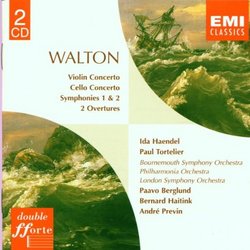| All Artists: Walton, Haitink, Berglund, Previn Title: Walton: Symphonies 1 & 2, Cello Concerto, etc Members Wishing: 0 Total Copies: 0 Label: EMI Classics Release Date: 11/2/1999 Genre: Classical Styles: Forms & Genres, Concertos, Theatrical, Incidental & Program Music, Historical Periods, Modern, 20th, & 21st Century, Instruments, Strings, Symphonies Number of Discs: 2 SwapaCD Credits: 2 UPCs: 724357337120, 724357337151 |
Search - Walton, Haitink, Berglund :: Walton: Symphonies 1 & 2, Cello Concerto, etc
 | Walton, Haitink, Berglund Walton: Symphonies 1 & 2, Cello Concerto, etc Genre: Classical
|
Larger Image |
CD Details |
CD ReviewsFEW ALTONIAN ALTERNATIVES TO THIS RELEASE! Melvyn M. Sobel | Freeport (Long Island), New York | 12/21/2000 (5 out of 5 stars) "Yet another gem in the budget firmament: A riveting "two-fer" from the EMI Double Forte catalogue, completely cost efficient, fully-packed with absolutely prime Walton--- no, make that essential Walton--- top-notch performances of each and every work, and excellent sound throughout. Haitink's reading of Symphony No. 1, with the Philharmonia, is a taut, arching, powerfully sustained fifty-one minute excursion into orchestral flourish and color, held beautifully together by its "Andante Con Malinconia" third movement. The more generally moody, less exhuberant Symphony No. 2 finds complete empathy in Previn's hands, the LSO playing just gloriously. Both concertos--- balancing Walton's romantic ideals with his pronounced 20th century leanings--- find warmly brilliant advocates in cellist Tortelier, violinist Ida Haendel, conductor Berglund and the Bournemouth Symphony Orchestra. The overtures, rhythmically good-natured, are excellent additions and rollicking fun under Previn. [Running time--- CD 1: 78:04 CD 2: 73:24]" Making a case for the curious Walton Santa Fe Listener | Santa Fe, NM USA | 05/24/2006 (4 out of 5 stars) "The amusingly splenetic review listed below will mystify newcomers to Walton. He is revered as a pioneering modernist in England, aging into a thorny national institution. Walton's idiom was brash and macho, but touched by romanticism and forever faithful to tonality. In America his equivalent would be William Schuman, equally aggressive but timid as modernism goes.
Both composers survive through a handful of works. Depending on how you look at it, Walton was lucky or unlucky to strike gold once only in each genre: he wrote one great film score (Henry V), one march (Crown Imperial), one overture (Portsmouth Point), one concerto (for viola), and one symphony (the First). His multiple attempts to follow up these successes generally fell flat. For some listeners, however, Walton's entire output is despicable. Either they are offended by his "ripoffs from Sibelius," as our raging reviewer calls them--Walton was a magpie of scraps from better composers. Or else his music just falls badly on the ear. I certainly feel that way about Belshazzar's Feast, a beloved choral staple in the UK that makes my skin crawl, as does Walton's sophisticated whimsy in Facade, set to poetic trifles by Edith Sitwell. Sit well is what his music often doesn't. I find that Haitink's civilized version of Sym. #1 makes a good case for it by erasing some of its bluntness and malice (yes, Walton's harsher music strikes some critics as outright malicious). It is better recorded and played than Previn's Telarc version with the Royal Phil. I also enjoyed the brief Portsmouth Point, but you have to be a Walton fan to get much from the other works on this bargain two-fer. Even the beloved Ida Haendel couldn't get me to warm up to the violin concreto. I like Walton's first tries and that's about it. " |

 Track Listings (7) - Disc #1
Track Listings (7) - Disc #1